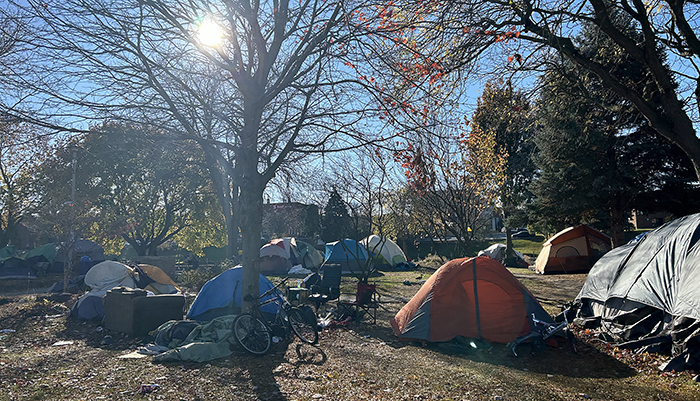
By Pam Wright
Local Journalism Initiative Reporter
It’s not yet clear how it will benefit Chatham-Kent, but new provincial legislation aimed at cracking down on encampments and open-air drug use is being welcomed by Mayor Darrin Canniff.
According to a media statement released by Premier Doug Ford Dec. 12, the government is stepping up with new funding and enforcement tools for police to address the burgeoning homelessness problem and make parks and public spaces safer for Ontarians.
“I’m happy to hear about this,” Canniff told The Voice following the announcement, noting it means municipalities will not have to take the drastic step of using the notwithstanding clause to clear encampments. “It’s the best of both worlds if we don’t have to do that. Moving forward, we’re getting some additional help to deal with the problem.”
Canniff was one of 12 Ontario mayors to sign a letter to Ford advocating for the use of the clause to deal with encampments. The move proved to be controversial, sparking backlash against using the notwithstanding clause from Ontario’s legal community, as well as other elected officials across the province, including five Chatham-Kent councillors.
When commenting on the new rules, Ford said the public deserves better.
“Mayors and residents from communities across Ontario have been clear that enough is enough when it comes to encampments and illegal drug use in our parks and public spaces,” Ford stated. “Families deserve to enjoy their local parks and playgrounds without fearing for their kids. People facing homelessness or addiction and mental health challenges should be supported in the right settings. The federal government’s approach of legalizing dangerous drugs for use in our communities has failed and it needs to end.”
The new measures will see an additional $75.5 million invested to further support homelessness prevention and provide people living in encampments with access to reasonable alternative accommodation. The money comes on top of the $700 million already funnelled to homelessness prevention programs annually, as well as $378 million that will be dedicated to addiction and recovery treatment (HART) hubs.
Chatham-Kent has made an application for a HART hub but locations have yet to be decided by the province.
Tougher legislation related to safety around encampments is also coming under the Safer Municipalities Act, which includes amendments to the Trespass to Property Act, applying to private business, offices, stores, hotels, parks and vacant land. If passed, the amendments will strengthen penalties for people who deliberately and continually break the law by way of continuously trespassing, with penalties taking place through the courts.
The Restricting Public Consumption of Illegal Substances Act will, if passed, permit police and other provincial offense officers to direct people using illegal substances to leave the public space. Tickets may be issued or arrests may be made. Penalties could include fines up to $10,000 or six months in prison.
The government is also exploring new judicial approaches that offer rehabilitation as an alternative to incarceration related to minor or non-violent drug crimes.
The breakdown in funding includes a $5.5-million top up to Canada-Ontario Housing Benefit to free up shelter spaces and assist those living in encampments to secure housing; $20 million to expand shelter capacity and create temporary shelters; and $50 million for ready-to-build affordable housing projects.
According to the media release, there are more than 3,300 people living in an estimated 1,000 encampments in Ontario.
The new rules won’t become law until approved when the Ontario Legislature resumes sitting in February.






